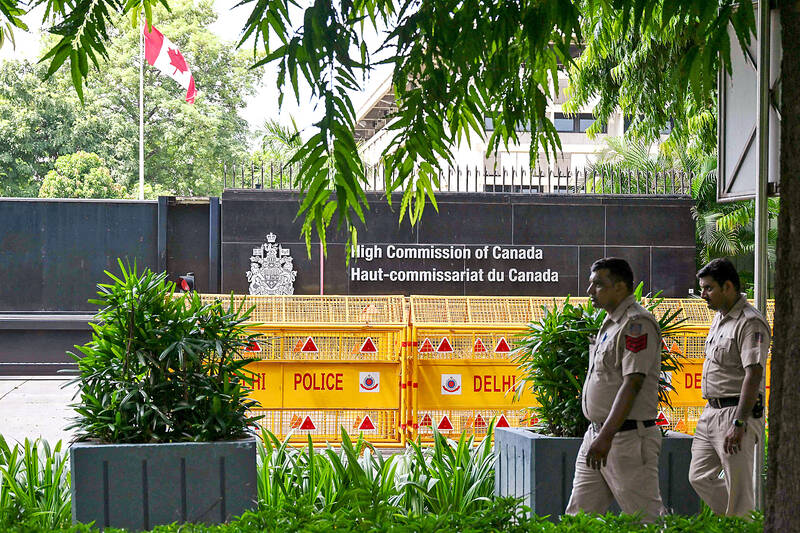Canada on Thursday said that it had withdrawn 41 diplomats from India — fallout from a bitter row over the killing of a Sikh separatist on Canadian soil.
New Delhi planned to revoke diplomatic immunity for all but 21 of Canada’s diplomats and their families by yesterday, forcing Ottawa to pull out the others, Canadian Minister of Foreign Affairs Melanie Joly said.
“We have facilitated their safe departure from India,” Joly said. “This means that our diplomats and their families have now left.”

Photo: AFP
Relations between India and Canada have plunged since Canadian Prime Minister Justin Trudeau last month publicly linked Indian intelligence to the killing of Canadian citizen Hardeep Singh Nijjar, which New Delhi has denied.
Nijjar, who advocated for a separate Sikh state carved out of India, was wanted by Indian authorities for alleged terrorism and conspiracy to commit murder.
“Revoking the diplomatic immunity of 41 diplomats is not only unprecedented, but also contrary to international law,” Joly said on Wednesday, but added that Canada did not plan to retaliate in kind, so as to not “aggravate the situation.”
“Canada will continue to defend international law, which applies to all nations and will continue to engage with India,” she said. “Now more than ever we need diplomats on the ground and we need to talk to one another.”
Canada has called for India to cooperate in the investigation, but New Delhi has rejected the allegations and taken countermeasures, such as shutting down visa services for Canadians.
Ottawa also expelled an Indian diplomat over the affair.
Indian Minister of External Affairs Subrahmanyam Jaishankar in New York last month said that his country would be willing to examine any evidence presented by Canada.
“We have actually been badgering the Canadians. We’ve given them loads of information about organized crime leadership which operates out of Canada,” Jaishankar said, referring to Sikh separatists.
“We have a situation where actually our diplomats are threatened, our consulates have been attacked and often comments are made [that are] interference in our politics,” he said.
The Indian government has called the Canadian accusations over the killing “absurd” and advised its nationals not to travel to some Canadian regions “given the increase in anti-Indian activities.”
New Delhi also temporarily stopped processing visa applications in Canada.
Nijjar, who immigrated to Canada in 1997 and became a Canadian citizen in 2015, was shot dead by two masked assailants in the parking lot of a Sikh temple near Vancouver in June.
Canada is home to about 770,000 Sikhs, who make up about 2 percent of the country’s population, with a vocal group calling for creating a separate state of Khalistan.
The Sikh separatist movement is largely finished within India, where security forces used deadly force to put down an insurgency in the state of Punjab in the 1980s.
Hundreds of Sikh protesters rallied outside Indian diplomatic missions in Canada last month, burning flags and trampling on pictures of Indian Prime Minister Narendra Modi.

Indonesia was to sign an agreement to repatriate two British nationals, including a grandmother languishing on death row for drug-related crimes, an Indonesian government source said yesterday. “The practical arrangement will be signed today. The transfer will be done immediately after the technical side of the transfer is agreed,” the source said, identifying Lindsay Sandiford and 35-year-old Shahab Shahabadi as the people being transferred. Sandiford, a grandmother, was sentenced to death on the island of Bali in 2013 after she was convicted of trafficking drugs. Customs officers found cocaine worth an estimated US$2.14 million hidden in a false bottom in Sandiford’s suitcase when

‘MOTHER’ OF THAILAND: In her glamorous heyday in the 1960s, former Thai queen Sirikit mingled with US presidents and superstars such as Elvis Presley The year-long funeral ceremony of former Thai queen Sirikit started yesterday, with grieving royalists set to salute the procession bringing her body to lie in state at Bangkok’s Grand Palace. Members of the royal family are venerated in Thailand, treated by many as semi-divine figures, and lavished with glowing media coverage and gold-adorned portraits hanging in public spaces and private homes nationwide. Sirikit, the mother of Thai King Vajiralongkorn and widow of the nation’s longest-reigning monarch, died late on Friday at the age of 93. Black-and-white tributes to the royal matriarch are being beamed onto towering digital advertizing billboards, on

CAUSE UNKNOWN: Weather and runway conditions were suitable for flight operations at the time of the accident, and no distress signal was sent, authorities said A cargo aircraft skidded off the runway into the sea at Hong Kong International Airport early yesterday, killing two ground crew in a patrol car, in one of the worst accidents in the airport’s 27-year history. The incident occurred at about 3:50am, when the plane is suspected to have lost control upon landing, veering off the runway and crashing through a fence, the Airport Authority Hong Kong said. The jet hit a security patrol car on the perimeter road outside the runway zone, which then fell into the water, it said in a statement. The four crew members on the plane, which

POWER ABUSE WORRY: Some people warned that the broad language of the treaty could lead to overreach by authorities and enable the repression of government critics Countries signed their first UN treaty targeting cybercrime in Hanoi yesterday, despite opposition from an unlikely band of tech companies and rights groups warning of expanded state surveillance. The new global legal framework aims to bolster international cooperation to fight digital crimes, from child pornography to transnational cyberscams and money laundering. More than 60 countries signed the declaration, which means it would go into force once ratified by those states. UN Secretary-General Antonio Guterres described the signing as an “important milestone,” and that it was “only the beginning.” “Every day, sophisticated scams destroy families, steal migrants and drain billions of dollars from our economy...